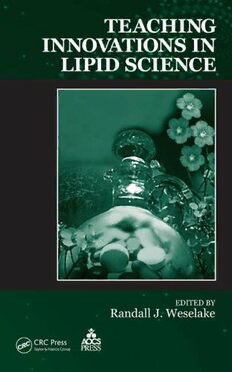Download Teaching Innovations in Lipid Science PDF Free - Full Version
Download Teaching Innovations in Lipid Science by Randall J. Weselake in PDF format completely FREE. No registration required, no payment needed. Get instant access to this valuable resource on PDFdrive.to!
About Teaching Innovations in Lipid Science
Featuring practical strategies and exciting experiments, Teaching Innovations in Lipid Science addresses lipid education at a range of levels from the novice to the graduate student and teacher. Peer-reviewed contributions from internationally known specialists, describe several methods and approaches designed to create new lipid courses, modify existing courses, and serve as a basis for pursuing novel avenues of instruction. Divided into two sections, the first focuses on teaching strategies and outlines some of the barriers that lipid science specialists face when transmitting accurate information. It emphasizes the development and implementation of creative programs that foster interest in lipid science, and presents novel problem-solving approaches. It discusses strategies for involving and evaluating independent study students and explains the successful use of sample cards to teach oilseed and cereal processing. This section also provides generalized accounts of biotechnology and crop improvement and isoprenoid biochemistry, including improvement of oilseed crops and tips on explaining DNA science and crop biotechnology. The second section begins with simple demonstrations on the physical properties of lipids suitable for middle- and high school students. It follows with more complex experiments on analyzing lipids in food oils, plasma, and milk utilizing thin layer chromatography, gas chromatography, and high performance liquid chromatography. Contributions include information on convenient enzyme test kits with exercises that can translate to a lab course beginning with chromatographic methods for lipid analysis. The final chapter presents theory and experiments for studying lipid metabolism in the plastid by describing preparation methods, studying metabolite uptake, and pathway analysis.
Detailed Information
| Author: | Randall J. Weselake |
|---|---|
| Publication Year: | 2007 |
| ISBN: | 9780849373695 |
| Pages: | 278 |
| Language: | English |
| File Size: | 5.606 |
| Format: | |
| Price: | FREE |
Safe & Secure Download - No registration required
Why Choose PDFdrive for Your Free Teaching Innovations in Lipid Science Download?
- 100% Free: No hidden fees or subscriptions required for one book every day.
- No Registration: Immediate access is available without creating accounts for one book every day.
- Safe and Secure: Clean downloads without malware or viruses
- Multiple Formats: PDF, MOBI, Mpub,... optimized for all devices
- Educational Resource: Supporting knowledge sharing and learning
Frequently Asked Questions
Is it really free to download Teaching Innovations in Lipid Science PDF?
Yes, on https://PDFdrive.to you can download Teaching Innovations in Lipid Science by Randall J. Weselake completely free. We don't require any payment, subscription, or registration to access this PDF file. For 3 books every day.
How can I read Teaching Innovations in Lipid Science on my mobile device?
After downloading Teaching Innovations in Lipid Science PDF, you can open it with any PDF reader app on your phone or tablet. We recommend using Adobe Acrobat Reader, Apple Books, or Google Play Books for the best reading experience.
Is this the full version of Teaching Innovations in Lipid Science?
Yes, this is the complete PDF version of Teaching Innovations in Lipid Science by Randall J. Weselake. You will be able to read the entire content as in the printed version without missing any pages.
Is it legal to download Teaching Innovations in Lipid Science PDF for free?
https://PDFdrive.to provides links to free educational resources available online. We do not store any files on our servers. Please be aware of copyright laws in your country before downloading.
The materials shared are intended for research, educational, and personal use in accordance with fair use principles.

